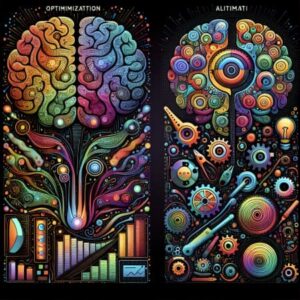Maximizing SEO Through AI Content Optimization Tools | 2024 Trends
In 2024, the use of AI technology to optimize content for search engines is becoming increasingly prevalent. With the rise of seo content optimization tools, businesses are able to create content that ranks higher on search engine results pages (SERP). By utilizing ai-generated content and machine learning, these tools can analyze data to help businesses optimize their content more effectively. One of the best ai optimization tools available is the ai writer, which can generate content based on keyword research and a content brief.
Using AI Tools for Content Creation
When it comes to content creation, AI tools can help businesses create content that is data-driven and tailored to their target audience. By using ai technology to analyze keyword research and content strategies, businesses can ensure that their content is optimized for seo. These tools can also provide content audits and seo analysis, helping businesses identify areas for improvement and optimize their content accordingly.
The Future of AI in Content Optimization
As we look ahead to 2024, it is clear that AI will continue to play a significant role in seo and content marketing. The best ai tools can analyze content and provide suggestions for content planning, on-page optimization, and more.
By using these tools to help with content creation, businesses can ensure that they are following best practices and producing content that resonates with their audience.
Optimization AI
Maximizing SEO Through AI Content Optimization Tools
In conclusion, the use of ai optimization tools is essential for businesses looking to improve their seo and content marketing strategies in 2024. By utilizing the best ai content optimization tools, businesses can generate content that ranks higher on search engine results pages and reaches a wider audience. With
In today’s fast-paced digital landscape, businesses are constantly looking for ways to stay ahead of the competition. One of the most effective ways to do this is by utilizing artificial intelligence (AI) tools to optimize their operations. AI tools have the ability to analyze vast amounts of data quickly and accurately, allowing businesses to make informed decisions and improve their overall performance. In this article, we will explore the top AI tools that are helping businesses optimize their processes and stay competitive in the market.
Benefits of Optimization AI Tools
Before we dive into the specific tools, let’s first discuss the benefits of using optimization AI tools in your business. Here are a few key advantages:
-
- Increased Efficiency: AI tools can automate repetitive tasks and streamline processes, allowing your team to focus on more strategic initiatives. This increased efficiency can lead to higher productivity and faster results.
-
- Improved Decision Making: By analyzing data in real-time, AI tools can provide valuable insights that can help you make informed decisions quickly. This can result in better strategic planning and more effective resource allocation.
-
- Enhanced Customer Experience: With AI tools, you can personalize customer interactions and deliver more targeted marketing campaigns, leading to higher customer satisfaction. This personalized approach can help build stronger relationships with customers and increase brand loyalty.
-
- Cost Savings: By optimizing processes and reducing errors, AI tools can help you save time and money in the long run. This can lead to improved profitability and a stronger financial position for your business.

Optimization AI tools
Top Optimization AI Tools
Now, let’s take a look at some of the top AI tools that are helping businesses optimize their operations:
1. Chatbots
Chatbots are AI-powered tools that can interact with customers in real-time, providing them with information and assistance. By using chatbots, businesses can improve their customer service and streamline their communication processes. Chatbots can also help businesses gather valuable customer data and feedback, which can be used to optimize their products and services.
2. Predictive Analytics
Predictive analytics tools use AI algorithms to analyze historical data and forecast future trends. By using predictive analytics, businesses can anticipate customer behavior, optimize their inventory management, and make more accurate sales forecasts. This can help businesses make smarter decisions and stay ahead of the competition. Some key benefits of predictive analytics include:
-
- Anticipating market trends and customer preferences
-
- Identifying potential risks and opportunities
-
- Improving marketing strategies and campaign effectiveness
3. Recommendation Engines
Recommendation engines use AI algorithms to analyze customer data and provide personalized recommendations. By using recommendation engines, businesses can boost their sales, increase customer engagement, and improve customer satisfaction. These tools are commonly used in e-commerce platforms to suggest products to customers based on their browsing history and preferences. Some advantages of recommendation engines include:
-
- Enhancing the user experience by offering personalized recommendations
-
- Increasing customer loyalty and retention
-
- Driving additional revenue through cross-selling and upselling opportunities
4. Natural Language Processing (NLP)
Natural Language Processing (NLP) tools use AI algorithms to analyze and interpret human language. By using NLP, businesses can automate tasks such as sentiment analysis, language translation, and text summarization. NLP tools can also be used to improve customer service by analyzing customer feedback and responding to inquiries in real-time. Some benefits of NLP tools include:
-
- Enhancing customer support through automated responses
-
- Improving data analysis and decision-making processes
-
- Enabling more efficient communication and information retrieval
Conclusion
In conclusion, optimization AI tools are invaluable for businesses looking to stay competitive in today’s fast-paced market. By leveraging AI tools such as chatbots, predictive analytics, recommendation engines, and NLP, businesses can improve their efficiency, make better decisions, and enhance their customer experience. If you’re looking to optimize your operations and drive growth, consider incorporating these AI tools into your business strategy.
FAQ
What are the benefits of using optimization AI tools in business?
-
- Increased Efficiency: AI tools can automate repetitive tasks and streamline processes, allowing your team to focus on more strategic initiatives.
-
- Improved Decision Making: By analyzing data in real-time, AI tools can provide valuable insights that can help you make informed decisions quickly.
-
- Enhanced Customer Experience: With AI tools, you can personalize customer interactions and deliver more targeted marketing campaigns, leading to higher customer satisfaction.
-
- Cost Savings: By optimizing processes and reducing errors, AI tools can help you save time and money in the long run.
How can chatbots help businesses optimize their operations?
Chatbots are AI-powered tools that can interact with customers in real-time, providing them with information and assistance. By using chatbots, businesses can improve their customer service and streamline their communication processes. Chatbots can also help businesses gather valuable customer data and feedback, which can be used to optimize their products and services.
What is the role of predictive analytics in optimizing business operations?
Predictive analytics tools use AI algorithms to analyze historical data and forecast future trends. By using predictive analytics, businesses can anticipate customer behavior, optimize their inventory management, and make more accurate sales forecasts. This can help businesses make smarter decisions and stay ahead of the competition.
How do recommendation engines help businesses optimize their processes?
Recommendation engines use AI algorithms to analyze customer data and provide personalized recommendations. By using recommendation engines, businesses can boost their sales, increase customer engagement, and improve overall customer satisfaction.
